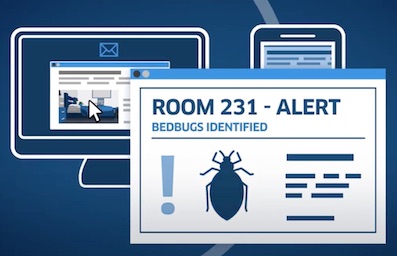 Cleanzine: your weekly cleaning and hygiene industry newsletter 26th June 2025 Issue no. 1168
Cleanzine: your weekly cleaning and hygiene industry newsletter 26th June 2025 Issue no. 1168
Your industry news - first
The original and best - for over 20 years!
We strongly recommend viewing Cleanzine full size in your web browser. Click our masthead above to visit our website version.
Coronavirus and bed bugs: how to protect your guests when you reopen
 The damage suffered by hotels during the Coronavirus pandemic may not be over once the Government greenlights a return to travel, according to creator of smart pest systems, Spotta. The UK-based company reveals that dormant bed bugs will live around a year without feeding; waiting for hotel guests to return.
The damage suffered by hotels during the Coronavirus pandemic may not be over once the Government greenlights a return to travel, according to creator of smart pest systems, Spotta. The UK-based company reveals that dormant bed bugs will live around a year without feeding; waiting for hotel guests to return.
"If your hotel had bed bugs before lockdown, you'll find them again when you reopen," says Robert Fryers, CEO at Spotta. "With a lifespan of more than a year, bed bugs are experts at conserving their energy when there's no food available. And they'll be hungry when your guests return."
Confirming Spotta's warning to hoteliers, Dr Richard Naylor, director and chief entomologist at The Bed Bug Foundation, says: "As we've seen with ski chalets closed for months during their off-season, I expect the first overnight guests in hotels post-Coronavirus closures will be met by hungry bugs."
Dr Naylor advised that while bed bugs are known to dislike light, rarely coming out during the day and hiding in the darkest places of hotel rooms such as under mattresses and in headboards, dormant bed bugs will awake from their slumber with an almost insatiable hunger.
He warns: "If they've been dormant for months, bed bugs will be highly aggressive, particularly when it's dark. If really hungry, they may also lose their phobia of light. This means bed bugs are much more likely to bite when a host returns."
As part of their Coronavirus recovery planning, hotels should allow time for identifying and treating bed bugs before reopening to guests.
But it's not all bad news for hoteliers, according to Dr Naylor: "Bed bugs are unlikely to be transmitted between buildings as people's movement is restricted," he says. "Whilst dormant, the bed bugs also won't be moving around your business, so you're likely to find them where they were before shutting your doors.
"Having known infestations treated by specialists is key to providing your guests a safe environment to return to, whilst monitoring systems are a good way to ensure guests won't get savaged as the bed bugs awake looking for a feed."
Adds Robert Fryers: "Bed bugs are attracted to carbon dioxide their potential host breathes out. They also like heat. To try and trick them into wasting their energy looking for food, you can up the heat in your rooms. However, we don't advise hoteliers to take this route due to the monetary and environmental costs of heating an empty room. Instead, investing in a smart monitoring system and working with your pest controllers to treat any infestations are key."
Founded in 2018, Spotta is utilising the latest technology to revolutionise pest control, shifting the industry from reactive to proactive. The Spotta Bed Pods offer accommodation providers what Spotta says is the first continuous monitoring system which can identify common pests - including bed bugs - removing the need for manual checks by staff. Spotta uses Artificial Intelligence to confirm the pests' identity at the earliest point of introduction, sending an alert to hotel management, encouraging hotels to treat the problem before infestations occur.
Since February 2019, the Pods have been installed in popular hotels in the UK. The Bed Pods run off Spotta's own long range, stable wireless network, with a low power image processing and communications system. Fuelled by a single battery which will last over a year, Spotta's 'fit and forget' technology is a time-saver for housekeeping and maintenance staff, helps protect affected hotels against reputational damage, and minimises treatment costs and litigation fees - all of which can save hotels up to £67,200 per year (based on 200-room hotel).
21st May 2020







